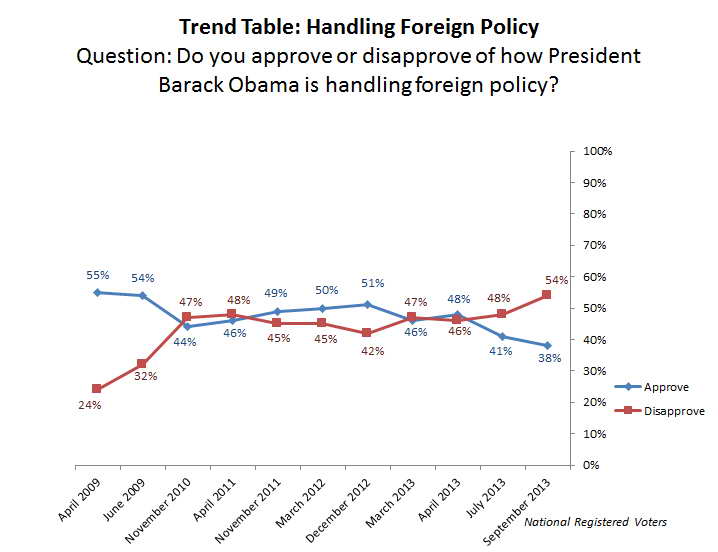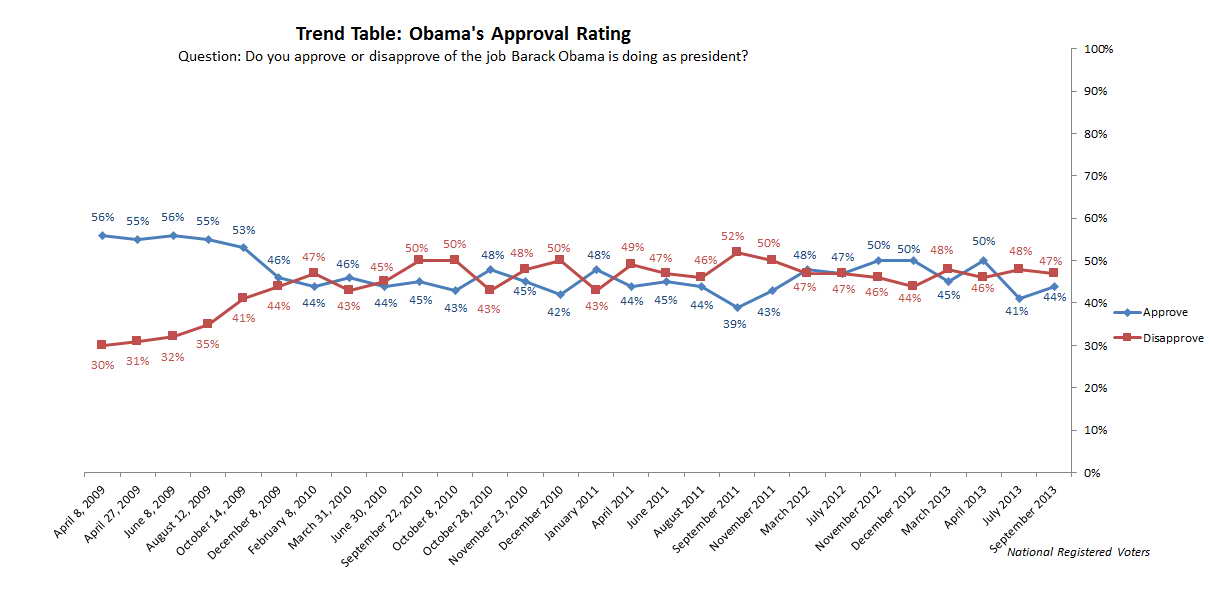September 10, 2013
9/10: Syria Viewed as Threat
McClatchy/Marist National Poll
While a majority of Americans think Syria’s use of chemical weapons threatens national security, they are against military involvement in the region. According to this national McClatchy-Marist Poll, nearly six in ten U.S. residents are concerned about long-term military involvement in the area, and only 21% believe waging limited air strikes in Syria would improve the situation in the region.
 A majority of Americans do not want Congress to approve the president’s proposal to strike Syria. However, if the president is able to win Congressional approval, Americans divide about U.S. military action in Syria.
A majority of Americans do not want Congress to approve the president’s proposal to strike Syria. However, if the president is able to win Congressional approval, Americans divide about U.S. military action in Syria.
Click Here for Complete September 10, 2013 USA McClatchy-Marist Poll Release and Tables
“The public and Congress still need to be convinced about what the president wants to accomplish and that he has a plan that will work,” says Dr. Lee M. Miringoff, Director of The Marist College Institute for Public Opinion. “The public is worried that the president does not have a clear direction and that military action will lead to long-term entanglements.”
When it comes to President Barack Obama’s proposal to use limited air strikes on military targets in Syria, 58% of Americans oppose such a response. 32% favor limited U.S. air strikes, and 11% are unsure. Looking at party, about two-thirds of Republicans — 66%, six in ten independents — 60%, and half — 50% — of Democrats are against air strikes as a military response.
Americans are even more opposed to putting boots on the ground in Syria. Most — 80% — are against the use of U.S. ground troops in Syria. Only 13% favor such military involvement, and 7% are unsure. Regardless of party affiliation, there is consensus on this question.
Half of Americans do not believe the president has spelled out his strategy. 50% do not think President Obama has a clear idea about what he wants to do in Syria. 41% believe he has a plan mapped out, and 8% are unsure. Not surprisingly, there is a partisan divide. However, even 32% of Democrats believe the president is unclear about the nation’s next steps in Syria. 59% of Democrats think Mr. Obama has a plan at the ready. 75% of Republicans and 52% of independents do not believe the president has a clear idea about what he wants to do in Syria.
This fuels the underlying fear of long-term military involvement. Almost six in ten Americans — 57% — say it is very likely or likely that limited air strikes on Syria will lead to a longer commitment in the region. 37%, however, do not expect continued involvement, and 6% are unsure.
Despite Americans’ hesitation to get involved in the region, 53% of Americans report Syria’s use of chemical weapons is a serious threat to the national security of the United States or its interests in the region. 39% do not think these actions are a significant threat, and 8% are unsure.
Table: Favor or Oppose Limited U.S. Air Strikes in Syria (U.S. Adults)
Table: Favor or Oppose U.S. Ground Troops in Syria (U.S. Adults)
Table: Does President Obama Have a Clear Strategy for Syria (U.S. Adults)
Table: Would Limited U.S. Air Strikes in Syria Lead to Long-Term Military Commitment? (U.S. Adults)
Table: Does Syria’s Use of Chemical Weapons Pose a Threat to the U.S.? (U.S. Adults)
Majority’s Message to Congress: “Keep U.S. Out of Syria”
53% of Americans do not want Congress to go along with President Obama’s request for a U.S. military response to Syria’s use of chemical weapons on its citizens. 38% want Congress to support the president’s request, and 8% are unsure.
While 65% of Republicans want Congress to reject the president’s request, nearly three in ten — 28% — want Congress to affirm it. Among independents, 54% want Congress to say, “No,” to the president while 36% want Congress to back his request. Democrats divide. 48% want Congress to support the president’s proposal while 44% want them to oppose it.
If Congress goes along with the president’s call for military action in Syria, Americans are somewhat more receptive to the idea of using military force in the region, but they are divided. 48% favor limited air strikes while 46% oppose them. Six percent are unsure.
Democrats bolster support. 57% of Democrats favor these strikes if Congress supports the president’s request. However, 55% of Republicans oppose them. Independents divide. 48% would oppose these attacks by the United States while 45% would favor them if the president wins cooperation from Congress.
Politically, 54% of registered voters say that it would make no difference to their vote if their elected official in Congress voted to approve U.S. air strikes on military targets in Syria. But, for voters that believe this issue matters to their vote, by about two to one, they are less likely to support their member of Congress if they agree to a military response in Syria — 28% — while 13% who would be more likely to vote for their elected representative. Four percent are unsure.
Regardless of party affiliation, a majority reports their vote would not be influenced if their congressperson voted with the president. However, 34% of Republicans and 32% of independent voters would be less likely to cast their ballot for their elected official if he or she supports the president’s request.
“Don’t Go It Alone,” Say Most Americans
If Congress denies the president’s request to use military force in Syria, 74% of Americans do not want the president to authorize air strikes on Syria. One in five — 20% — does want the president to take unilateral action, and 6% are unsure. 81% of Republicans and 78% of independents do not want the president to act without the approval of Congress. Nearly two-thirds of Democrats — 65% — say the same.
However, for a majority of Americans — 52%, the president’s request for Congressional approval to use military force in Syria makes him look strong. About one-third — 33% — perceives him as weak, and 15% are unsure.
While half of Republicans — 50% — think the president’s request makes him look weak, 40% of the GOP view his actions as strong. 66% of Democrats and nearly half of independent voters — 49% — view the president’s request to Congress in the same way.
Do Americans want the U.S. to forge international alliances before taking military action in Syria? 76% say it is necessary for the U.S. to have support from other countries before proceeding with a military response in Syria. 22% believe it is not necessary, and 2% are unsure.
Table: Should the U.S. Launch Air Strikes without Congressional Approval (U.S. Adults)
Table: Perception of President Obama’s Request to Take Military Action in Syria (U.S. Adults)
Would the Ends Justify the Means?
Half of adults nationally — 50% — do not think waging limited air strikes on Syria is likely to achieve America’s military goals. 41% of Americans disagree. Eight percent are unsure.
There is a partisan divide here. A slim majority of Democrats — 51% — think it is either very likely or likely that the United States will achieve its military goals in Syria. This compares with 36% of Republicans. Independents align with Republicans on this question. Only 35% of these voters think the U.S. will meet its military goals in the region.
What kind of impact do Americans think the use of limited air strikes by the United States would have? A plurality of Americans — 46% — think such military action would make the situation worse in the area. 21% believe it would make it better, and 29% say it would make no difference. Four percent are unsure.
Americans divide over whether or not air strikes would discourage Syria from using chemical weapons on its citizens in the future. 49% think U.S. action would not, and 47% report it is likely that U.S. military involvement would successfully restrain Syria from future use of chemical weapons. Four percent are unsure.
When it comes to whether or not military air strikes would keep other countries from employing chemical weapons, 50% of Americans believe it is either very likely — 16% — or likely — 34% — that U.S. action would accomplish this goal. 45% of adults say it is not likely U.S. air strikes would result in future restraint by other countries. Four percent are unsure.
Table: Likelihood U.S. Air Strikes Would Achieve U.S. Military Goals (U.S. Adults)
Table: Would U.S. Air Strikes in Syria Make the Situation in the Region Better? (U.S. Adults)
Obama’s Foreign Policy Rating at Lowest Point in Presidency
There’s more bad news for President Obama. The president’s approval rating on foreign policy is his lowest since taking office. 38% approve of how he is handling the issue while majority of registered voters — 54% — disapprove. Eight percent are unsure.
When McClatchy-Marist last reported this question in July, 41% approved of how Mr. Obama was dealing with foreign policy. 48% disapproved, and 10% were unsure. That 41% approval rating on foreign policy was the president’s lowest until this time.
Table: Handling Foreign Policy
Table: Handling Foreign Policy (Over Time)
President’s Approval Rating at 44%
Voters divide about the job President Obama is doing in office. While 44% approve, 47% disapprove. Nine percent are unsure. When McClatchy-Marist last reported this question in July, 41% of registered voters thought well of his job performance. 48% gave him low marks, and 11%, at the time, were unsure.
Table: President Obama Approval Rating
Table: President Obama Approval Rating (Over Time)



